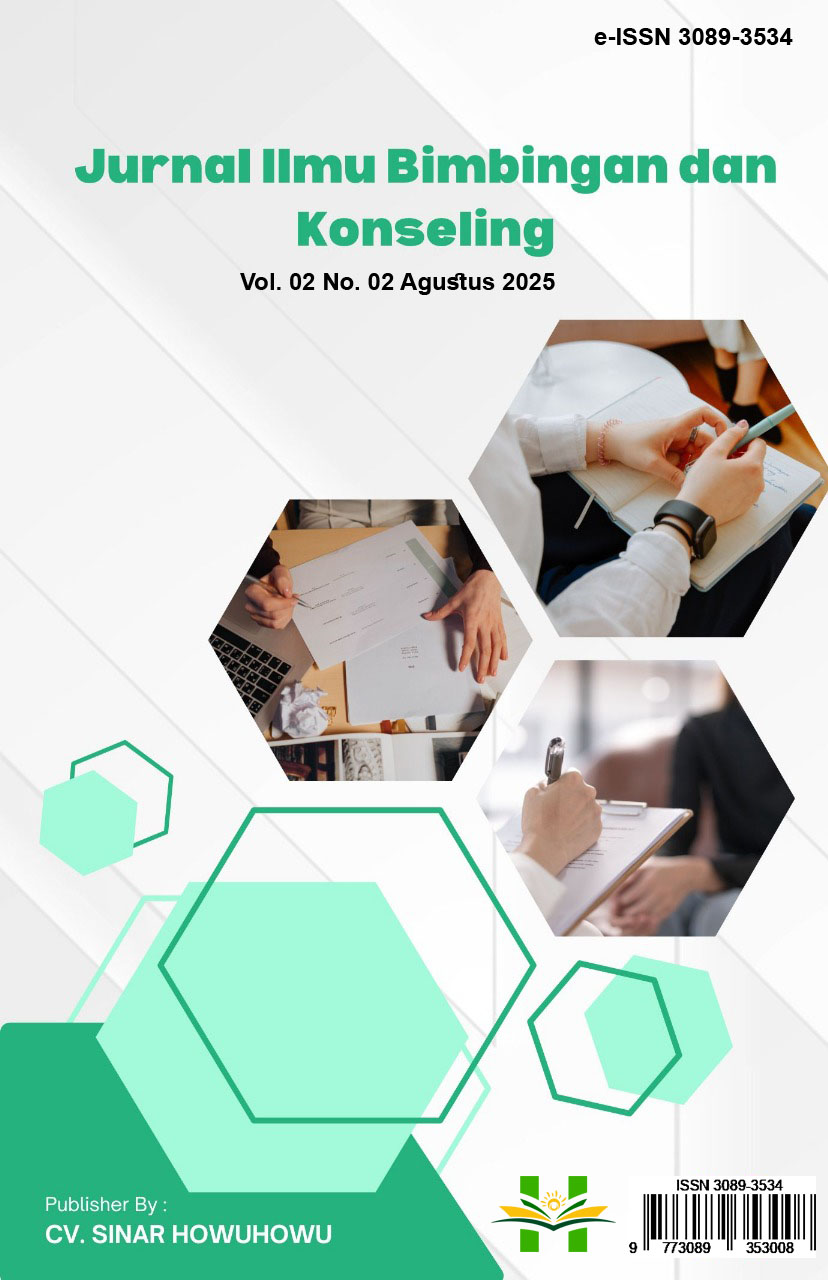Pengaruh Self-Efficacy Terhadap Perencanaan Karir Mahasiswa Tingkat Akhir
DOI:
https://doi.org/10.70134/bikoling.v2i2.656Keywords:
Self-efficacy, Career Planning, Final Year Students, Motivation, Career GuidanceAbstract
This study aims to analyze the influence of self-efficacy on career planning among final year students. Self-efficacy, defined as an individual's belief in their own abilities, plays a crucial role in determining readiness and strategies for career planning. The research employed a quantitative correlational design involving 120 final year students selected through purposive sampling. Data were collected using questionnaires and analyzed with simple linear regression. The results indicate a positive and significant influence of self-efficacy on career planning, with self-efficacy explaining 42% of the variance in students’ career planning. These findings highlight the importance of strengthening self-efficacy through psychological interventions and career guidance programs to support students’ preparedness for the workforce. The implications of this study are expected to guide the development of career services in higher education institutions.
Downloads
References
Amalia, R., & Setiawan, M. (2022). Faktor-faktor yang mempengaruhi perencanaan karir mahasiswa tingkat akhir. Jurnal Psikologi Terapan, 10(2), 89-100.
Arulmani, G., & Henn, L. (2019). Career guidance for development: A global perspective. International Journal for Educational and Vocational Guidance, 19(1), 1-7.
Bandura, A. (1986). Social foundations of thought and action: A social cognitive theory. Englewood Cliffs, NJ: Prentice-Hall.
Bandura, A. (1997). Self-efficacy: The exercise of control. New York: W.H. Freeman and Company.
Betz, N. E., & Hackett, G. (1997). Applications of self-efficacy theory to understanding career choice behavior. Journal of Vocational Behavior, 31(3), 322-339.
Brown, D., & Lent, R. W. (2013). Career development and counseling: Putting theory and research to work. Hoboken, NJ: Wiley.
Chai, E. K., & Wong, S. L. (2017). The impact of self-efficacy on career exploration and career planning. Journal of Career Assessment, 25(3), 552-565.
Flores, L. Y., & O'Brien, K. M. (2002). Self-efficacy as a predictor of career decision-making difficulties. Journal of Vocational Behavior, 61(3), 329-346.
Fouad, N. A., & Bynner, J. (2008). Work transitions. American Psychologist, 63(4), 241-251.
Gati, I., & Asher, I. (2001). The concept of career decision making and its assessment. International Journal for Educational and Vocational Guidance, 1, 39-54.
Gushue, G. V., & Whitson, M. L. (2006). Career counseling with racial and ethnic minority populations. Journal of Career Development, 32(3), 214-225.
Hackett, G., & Betz, N. E. (1981). A self-efficacy approach to the career development of women. Journal of Vocational Behavior, 18(3), 326-339.
Herr, E. L. (2001). Career development and its practice: A historical perspective. Career Development Quarterly, 49(3), 196-211.
Hirschi, A. (2012). The career resources model: An integrative framework for career counselors. The Career Development Quarterly, 60(4), 301-314.
Ismail, H. N., Ibrahim, R., & Rahman, A. (2020). The role of social support on self-efficacy and career development among university students. International Journal of Academic Research in Business and Social Sciences, 10(1), 123-132.
Komarraju, M., & Nadler, D. (2013). Self-efficacy and academic achievement: Why do implicit beliefs matter? Journal of Psychology, 147(1), 55-67.
Lent, R. W. (2013). Social cognitive career theory. In S. D. Brown & R. W. Lent (Eds.), Career development and counseling: Putting theory and research to work (2nd ed., pp. 115–146). Hoboken, NJ: Wiley.
Lent, R. W., & Brown, S. D. (2013). Understanding and facilitating career development in the 21st century. Career Development Quarterly, 61(4), 283-288.
Lent, R. W., & Brown, S. D. (2019). Social cognitive career theory at 25: Empirical status, new directions, and practical applications. Journal of Career Assessment, 27(1), 3-25.
Lent, R. W., Brown, S. D., & Hackett, G. (1994). Toward a unifying social cognitive theory of career and academic interest, choice, and performance. Journal of Vocational Behavior, 45(1), 79-122.
Lent, R. W., Brown, S. D., & Hackett, G. (2000). Contextual supports and barriers to career choice: A social cognitive analysis. Journal of Counseling Psychology, 47(1), 36–49.
Lent, R. W., Brown, S. D., & Hackett, G. (2002). Social cognitive career theory. In D. Brown (Ed.), Career choice and development (4th ed., pp. 255–311). San Francisco: Jossey-Bass.
Lent, R. W., Brown, S. D., Nota, L., & Soresi, S. (2003). Social cognitive predictors of academic interests and goals in Italian high school students. Journal of Vocational Behavior, 62(1), 58-72.
Noe, R. A. (2010). Employee training and development (5th ed.). New York: McGraw-Hill.
Oktaviani, D., & Rachman, F. (2020). Hubungan antara self-efficacy dan kesiapan karir mahasiswa di perguruan tinggi. Jurnal Psikologi dan Konseling, 12(2), 102-110.
Patton, W., & McMahon, M. (2014). Career development and systems theory: Connecting theory and practice (3rd ed.). Rotterdam: Sense Publishers.
Putri, M., & Hartono, A. (2022). Strategi pengembangan self-efficacy untuk karir mahasiswa. Jurnal Psikologi Terapan, 11(1), 33-41.
Sari, D. P., & Hidayat, R. (2020). Peran bimbingan karir dalam meningkatkan self-efficacy mahasiswa. Jurnal Pengembangan Pendidikan, 8(1), 45-54.
Savickas, M. L. (2005). The theory and practice of career construction. In S. D. Brown & R. W. Lent (Eds.), Career development and counseling: Putting theory and research to work (pp. 42–70). Hoboken, NJ: Wiley.
Schunk, D. H. (1991). Self-efficacy and academic motivation. Educational Psychologist, 26(3-4), 207-231.
Super, D. E. (1990). A life-span, life-space approach to career development. In D. Brown, L. Brooks (Eds.), Career choice and development (pp. 197-261). San Francisco: Jossey-Bass.
Super, D. E., Savickas, M. L., & Super, C. M. (1996). The life-span, life-space approach to careers. In D. Brown & L. Brooks (Eds.), Career choice and development (3rd ed., pp. 121-178). San Francisco: Jossey-Bass.
Taylor, K. M., & Betz, N. E. (1983). Applications of self-efficacy theory to the understanding and treatment of career indecision. Journal of Vocational Behavior, 22(1), 63-81.
Wahyuni, S., & Prasetyo, A. (2021). Pengaruh self-efficacy terhadap kesiapan karir mahasiswa. Jurnal Psikologi Pendidikan dan Konseling, 7(2), 95-104.
Yuliana, R. (2019). Faktor-faktor yang mempengaruhi perencanaan karir mahasiswa. Jurnal Pendidikan dan Kebudayaan, 4(3), 232-240.
Downloads
Published
Issue
Section
License
Copyright (c) 2025 Januariadi (Author)

This work is licensed under a Creative Commons Attribution-ShareAlike 4.0 International License.













